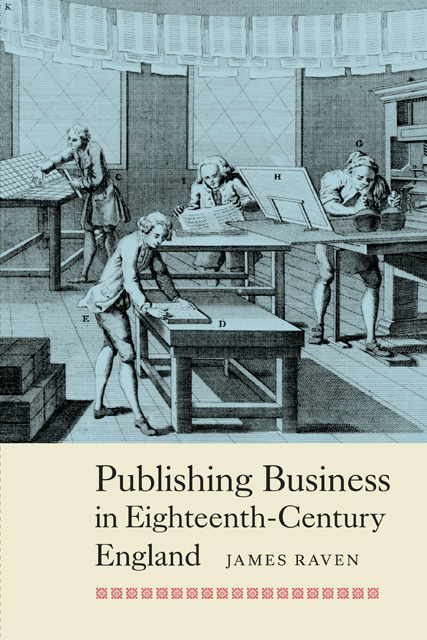Book contents
- Frontmatter
- Dedication
- Contents
- Acknowledgements
- Notes on Dates, Booksellers, Founts and Intaglio
- List of Abbreviations
- 1 The Mediation of the Press
- 2 England and the Uneven Economic Miracle
- 3 The Printed and the Printers
- 4 Serviced by Stationery and Printing
- 5 Printing and the City of London
- 6 Advertising
- 7 The Advertisers
- 8 Intelligence
- 9 Instruction and Guidance
- 10 Wider Discussion
- 11 Business, Publishing and the Gentleman Reader
- Conclusion
- Bibliography of Printed Sources
- Index
3 - The Printed and the Printers
Published online by Cambridge University Press: 28 February 2023
- Frontmatter
- Dedication
- Contents
- Acknowledgements
- Notes on Dates, Booksellers, Founts and Intaglio
- List of Abbreviations
- 1 The Mediation of the Press
- 2 England and the Uneven Economic Miracle
- 3 The Printed and the Printers
- 4 Serviced by Stationery and Printing
- 5 Printing and the City of London
- 6 Advertising
- 7 The Advertisers
- 8 Intelligence
- 9 Instruction and Guidance
- 10 Wider Discussion
- 11 Business, Publishing and the Gentleman Reader
- Conclusion
- Bibliography of Printed Sources
- Index
Summary
‘Publishing’ is a very broad activity. It is the making public, to a lesser or greater extent, of material items that are scribal, printed or a mixture of both, and textual or pictorial or a mixture of both. Publishing is the dissemination of materials that are books, pamphlets, newspapers, periodicals, single sheets, or a great range of small printed items such as forms and advertisements, or an indeterminate amalgam or blend of these formats. As the commercial market for books and print developed in early modern and eighteenth-century England, so did the different profiles of demand, distribution and financial mediation. The resulting precautionary and punitive regulation by Church and state was much abetted by the property interests of leading booksellers, printers and stationers. The book trade advanced as a trade in argument, in knowledge, in belief, in instruction and in entertainment. The trade brought for its promoters and craftsmen fortunes as well as financial and personal disaster, and jobbing printing (that is the printing of small items other than books) supported the business of the printer more than any other type of custom.
From the late seventeenth century in particular, the volume, quality and location of printing, publication and jobbing printing in England was transformed. The scale of press activity was unprecedented. Nothing as potent had been seen since the arrival of the printing press across Europe in the mid to late fifteenth century. What was even more remarkable was that printing-house business accelerated despite a virtual technological standstill in the design of the common printing press.
Unsurprisingly, early modern book publishing in Britain was dominated by publishing in England, and book publishing in England dominated in turn by publishing in London. Yet even London book production and marketing appeared, in relative terms, to be limited before the eighteenth century, and although the endeavours of printers in provincial cities and market towns throughout the three kingdoms were crucial, they have been lost to historical view. Many of the productions were ephemeral and no longer survive, although numerous records attest to the commission, manufacture and consumption of their products, and most particularly in the country towns as well as in the financial centre of London.
- Type
- Chapter
- Information
- Publishing Business in Eighteenth-Century England , pp. 33 - 62Publisher: Boydell & BrewerPrint publication year: 2014

